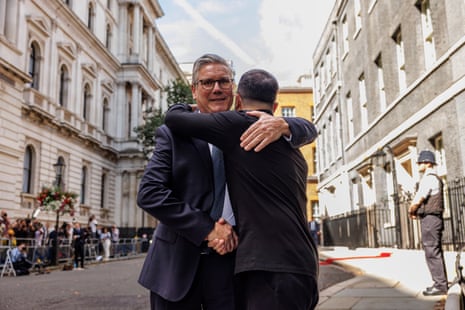Zelenskyy says he discussed security guarantees for Ukraine with Starmer at No 10 meeting
Ukrainian president Volodymyr Zelenskyy said on Thursday that he had a detailed discussion of possible security guarantees for Ukraine during a “productive meeting” with prime minister Keir Starmer.
“We also discussed in considerable detail the security guarantees that can make peace truly durable if the United States succeeds in pressing Russia to stop the killings and engage in genuine, substantive diplomacy,” he wrote on X.

Zelenskyy added that the leaders also touched on investment in Ukrainian drone production.
Alongside a video of the meeting at 10 Downing Street, Zelenskyy wrote in his social media post:
A good, productive meeting with UK prime minister Keir Starmer. We continue to coordinate our positions.
Yesterday, together with all our partners, and today in a bilateral format, we discussed expectations for the meeting in Alaska and possible prospects. We also discussed in considerable detail the security guarantees that can make peace truly durable if the United States succeeds in pressing Russia to stop the killings and engage in genuine, substantive diplomacy. It is important that, within the framework of the coalition of the willing, we should all be able to achieve effective formats for security cooperation.
We also discussed the continuation of support programmess for our army and our defence industry. Under any scenario, Ukraine will maintain its strength. Keir and I also talked about such mechanisms for weapons supplies as the PURL programme, and I urged the UK to join. Of course, we also discussed our one hundred year partnership agreement. Ukraine is preparing to ratify it in August, and as a result, we will be able to hold an expanded Ukraine-UK meeting.
A separate and important item on the agenda was investment in our drone production. We have significant potential to increase production volumes and urgently need financing for this. Drones play a decisive role on the frontline, and Ukraine’s capabilities to produce them are exceptional. Therefore, investment in such production can truly influence the situation at the strategic level. We are working with the UK and all our partners on this. Keir, thank you for your support!
Key events
Lib Dems urge environment secretary to rule out sale of Thames Water to Hong Kong’s CKI
The Liberal Democrats have urged environment secretary Steve Reed to rule out the sale of Thames Water to Hong Kong infrastructure company CKI, if it enters special administration, and for any deal to receive parliamentary scrutiny before being agreed.
CKI, which invests in power and other utility companies in the UK, is among those lining up to acquire the water and sewerage supplier if it enters a special administration regime (SAR), according to the Times.
In a statement shared on Thursday, the Lib Dems said a “Conservative loophole” in legislation passed by the last government could allow the deal to go ahead without an automatic national security check.
The Lib Dems said:
Water is not currently classed as critical infrastructure under the National Security and Investment Act, passed by the previous Conservative government, meaning foreign takeovers can happen without automatically undergoing stringent national security checks before any sale is approved.
The Liberal Democrats are calling on the government to block the sale of Thames Water to the Chinese firm, also pointing to concerns about the role of Chinese company Jingye in the recent collapse of British Steel.
Farron said:
The government is guilty of shocking weakness when it comes to China. First British Steel, then the super embassy, and now the sale of a big chunk of our critical water infrastructure. It’s time they took our critical national infrastructure more seriously.
It is unthinkable that such vital infrastructure as our own water supply should be sold by the government to a Chinese firm. Even considering such a move would show that the government is fundamentally unserious about protecting infrastructure, and about improving our water system, rivers and seas after years of abuse.
It’s equally shocking that the previous Conservative government left a gaping loophole in our national security legislation, allowing foreign takeovers of our critical water companies to go ahead without automatically going through stringent checks.
Steve Reed must rule any sale to a Chinese firm out as a matter of urgency and any potential sale of Thames Water by the government should be subject to proper parliamentary scrutiny.

Larry Elliott
One estimate last week said Rachel Reeves will need to find more than £50bn to stick to her fiscal rule with a reasonable margin for error. Even though other forecasts suggest the figure may be lower than that, there will still be difficult choices to make.
Faced with these pressures, Reeves should do two things. First, she should end the freeze on fuel duty, which has been kept in place no matter whether the cost of petrol and diesel is high or low. It is not just that Reeves could well do with the several billion pounds that a rise in fuel duty would harvest. Fuel duty is now a third lower, in real terms, than it was when Alistair Darling was at the Treasury, effectively cutting the cost of motoring and so creating incentives to drive more. Increased congestion and the potholed roads are consequences of that.
The stated rationale for the protracted freeze since 2010 is that it helps hard-pressed motorists, but the main beneficiaries have not been white-van man but the better off, who drive more, own more vehicles and buy gas-guzzling SUVs. The richest fifth of households have benefited twice as much from the fuel duty freeze as the poorest fifth. Raising fuel duty in the budget should be a no-brainer for Reeves.
But the chancellor also needs to come up with a plan for what to do once the era of all-electric vehicles finally arrives, and here there is an obvious solution: road pricing. Conceptually, there should be little problem with this idea. People expect to pay more for a train journey in rush hours. Hotels charge more for rooms on a Friday or Saturday when demand is higher. The same principle should apply to roads.
There are reasons why ministers are reluctant to grasp this nettle. Fuel duty, while a regressive tax, is easy to understand. There are no issues with privacy and surveillance, as there would be with road pricing. Governments are sensitive to charges that they are planning to wage war on motorists. Given that only 5% of vehicles are electric currently, the transition may take longer than originally envisaged. No question, doing nothing has its attractions.
But the costs of inaction will grow over time. A report by the Tony Blair Institute for Global Change (TBI) said the loss of tax revenue from cars would be £10bn by 2030, £20bn by 2035 and £30bn by 2040. This would inevitably lead to chunky tax increases. Reducing the cost of motoring by continually freezing fuel duty would lead to more and longer traffic jams. Those still driving petrol and diesel vehicles would face a triple whammy: spending longer in traffic; paying higher taxes elsewhere to compensate for the lost fuel-duty revenue from those who transferred to electric vehicles; and paying three to four times more for tax and fuel than those who drive EVs.
The education secretary has called the “entrenched divide” in outcomes and the lack of progress for white working-class children “concerning”, reports the PA news agency.
On A-level results day, Bridget Phillipson said:
Every single young person collecting their results today should have the opportunity to pursue their dreams – whether that starts with further study, university, an apprenticeship or the world of work – but, too often, opportunities depend on background rather than talent.
The entrenched divide in outcomes seen over the last few years and the lack of progress for children from white working-class backgrounds is particularly concerning.
Through our plan for change we are breaking the link between background and success, starting with reformed early years and revitalised family services, through to ambitious reforms to our school and post-16 system to make sure every young person, wherever they grow up, is truly ready for life and work.
People trying to enter the UK by hiding in refrigerated trailers present a “constant threat” to food safety, according to a report.
The study, published by logistics company Oakland International, stated that 4,415 instances of a truck or van being found with stowaways seeking to reach the UK were recorded between 2016 and 2023.
An average of nearly 100 people per month were detected infiltrating trucks entering the UK between January and September last year, PA reported.
People hiding in trailers cause delays, increased costs, potential damage to goods and disposal of produce, researchers found.
Companies transporting food, household goods and healthcare items dispose of an average of 56% of stock on an infiltrated lorry.
The value of lost stock can be up to tens of thousands of pounds, research found. This can result in revenue loss several times higher.
Volodymyr Zelenskyy has urged the UK to join Nato’s Prioritised Ukraine Requirements List (PURL) programme for equipment and munitions.
After his talks with prime minister Keir Starmer, the Ukrainian president wrote on X: “Yesterday, together with all our partners, and today in a bilateral format, we discussed expectations for the meeting in Alaska and possible prospects.
“We also discussed in considerable detail the security guarantees that can make peace truly durable if the United States succeeds in pressing Russia to stop the killings and engage in genuine, substantive diplomacy.
“It is important that, within the framework of the coalition of the willing, we should all be able to achieve effective formats for security cooperation.
“We also discussed the continuation of support programmes for our army and our defence industry. Under any scenario, Ukraine will maintain its strength.
“Keir and I also talked about such mechanisms for weapons supplies as the PURL programme, and I urged the UK to join. Of course, we also discussed our one hundred year partnership agreement. Ukraine is preparing to ratify it in August and, as a result, we will be able to hold an expanded Ukraine-UK meeting.”

Lauren Almeida
Claims of an exodus of wealthy “non-doms” in response to tax rises may be overblown, according to a report that suggests that the number leaving the country is in line with official forecasts.
In April the chancellor, Rachel Reeves, scrapped the non-domiciled tax status, which allowed wealthy individuals with connections abroad to avoid paying full UK tax on their overseas earnings.
Since then a wave of reports has suggested that changes to the status and other tax policies are triggering an exodus of high net worth individuals.
However, early monthly payroll data from HM Revenue and Customs appears to indicate that the number of non-dom departures are in line with official predictions, according to sources cited by the Financial Times
The Office for Budget Responsibility (OBR) forecast in January that 25% of non-doms with trusts would leave the UK in response to the abolition of the tax status, while 10% of those without trusts would leave. Official data suggests that this prediction was broadly correct, people briefed on the findings told the FT.
Jeremy Hunt, the chancellor’s Conservative predecessor, first announced moves to phase out the 225-year-old non-dom status that protected overseas earnings from being taxed in exchange for a flat annual fee. However, Labour took the proposals a step further by replacing them with a regime that will include overseas assets in the UK’s 40% inheritance tax rate.
Many non-doms earn income from work or their pensions in the UK, which means they appear in the PAYE (pay as you earn) figures in the payroll data that businesses send to the tax office each month. If they fall off PAYE figures, that suggests that they have left the country.
The FT reported that some of those briefed on early HMRC data said payroll figures suggested that fewer people were leaving than projected by the OBR, while others said the departures were in line with forecasts.
The numbers do not capture the movements of those non-doms who do not work in the UK, which could include some of the richest, but with a shortage of reliable data they will provide some relief to Reeves amid a debate about whether the policy could backfire.
Keir Starmer and Volodymyr Zelenskyy agreed there was a “powerful sense of unity and a strong resolve” to secure peace in Ukraine during a breakfast meeting on Thursday, Downing Street said.
In a readout of the meeting, a Number 10 spokesperson said:
The prime minister hosted President Zelenskyy in Downing Street this morning.
They had a private breakfast, where they discussed yesterday’s meetings. They agreed there had been a powerful sense of unity and a strong resolve to achieve a just and lasting peace in Ukraine.
They then looked ahead to tomorrow’s talks between President Trump and President Putin in Alaska, which present a viable chance to make progress as long as Putin takes action to prove he is serious about peace.
They agreed to stay in close touch in the coming days.
Also posting on X after the meeting in Downing Street today, Keir Starmer said of Ukrainian president Volodymyr Zelenskyy:
Great to see you, my friend @ZelenskyyUa.
Britain will always stand with Ukraine.
Zelenskyy says he discussed security guarantees for Ukraine with Starmer at No 10 meeting
Ukrainian president Volodymyr Zelenskyy said on Thursday that he had a detailed discussion of possible security guarantees for Ukraine during a “productive meeting” with prime minister Keir Starmer.
“We also discussed in considerable detail the security guarantees that can make peace truly durable if the United States succeeds in pressing Russia to stop the killings and engage in genuine, substantive diplomacy,” he wrote on X.
Zelenskyy added that the leaders also touched on investment in Ukrainian drone production.
Alongside a video of the meeting at 10 Downing Street, Zelenskyy wrote in his social media post:
A good, productive meeting with UK prime minister Keir Starmer. We continue to coordinate our positions.
Yesterday, together with all our partners, and today in a bilateral format, we discussed expectations for the meeting in Alaska and possible prospects. We also discussed in considerable detail the security guarantees that can make peace truly durable if the United States succeeds in pressing Russia to stop the killings and engage in genuine, substantive diplomacy. It is important that, within the framework of the coalition of the willing, we should all be able to achieve effective formats for security cooperation.
We also discussed the continuation of support programmess for our army and our defence industry. Under any scenario, Ukraine will maintain its strength. Keir and I also talked about such mechanisms for weapons supplies as the PURL programme, and I urged the UK to join. Of course, we also discussed our one hundred year partnership agreement. Ukraine is preparing to ratify it in August, and as a result, we will be able to hold an expanded Ukraine-UK meeting.
A separate and important item on the agenda was investment in our drone production. We have significant potential to increase production volumes and urgently need financing for this. Drones play a decisive role on the frontline, and Ukraine’s capabilities to produce them are exceptional. Therefore, investment in such production can truly influence the situation at the strategic level. We are working with the UK and all our partners on this. Keir, thank you for your support!
Greenpeace have attached a new work, titled Butchered, by the renowned artist Anish Kapoor on to a Shell platform in the North Sea – the world’s first artwork to be installed on an active offshore gas site.
After securing a 12-metre x 8-metre canvas to the structure, the activists hoisted a high-pressure hose 16 metres above sea level. They then pumped 1,000 litres of blood-red liquid that seeped into the fabric, creating a vast crimson stain.
Greenpeace say the work is a stark visualisation of the wound inflicted on humanity and the Earth by the fossil fuel industry, and aims to represent the collective grief and pain over what has been lost, as well as a call for reparation.
Shelter have described no-fault evictions as one of the leading causes of homelessness, giving landlords the power to evict tenants without any reason given.
The charity said its analysis of the latest figures suggested that for every month a ban on no-fault evictions is delayed, about 950 households could be removed from their homes by bailiffs.
Echoing the call for an urgent ban, homelessness charity Crisis said many are at risk of homelessness if faced with eviction.
According to the PA news agency, the charity’s chief executive, Matt Downie, said:
Despite good intentions from the Westminster government, thousands of people are still being unjustly evicted from their homes and threatened with – or even forced into – homelessness.
We know the UK government has had a packed agenda, but we now need ministers to rebuff efforts to weaken the renters’ rights bill and get this new legislation on to the statute book as soon as possible when parliament returns. Unfreezing housing benefit in the autumn would also ensure that more people in England can afford a safe and stable home.
The Renters’ Reform Coalition, said the year-on-year fall in accelerated procedure claims “blows apart the myth of a ‘landlord exodus’ and eviction surge caused by the renters’ rights bill” and urged the government to “press on and abolish section 21 immediately once the bill is passed”.
The new data on no-fault evictions published today by the Ministry of Justice (see 11.23am BST) comes a week after Rushanara Ali resigned her role as homelessness minister after a report that she gave tenants at a property she owned in east London four months’ notice to leave before relisting the property with a £700 rent increase within weeks.
Ali’s house, rented on a fixed-term contract, was put up for sale while the tenants were living there, and it was only relisted as a rental because it had not sold, according to the i newspaper.
Such a move would probably be prohibited under the renters’ rights bill, which is set to introduce new protections for tenants including banning landlords who evict tenants in order to sell their property from relisting it for rent for six months.
In her resignation letter Ali insisted she had “at all times” followed “all legal requirements” and taken her responsibilities “seriously”, but added that continuing in her role would be “a distraction from the ambitious work of the government” and therefore was stepping down.
Boosting productivity will be main priority of autumn budget, Reeves says

Richard Partington
Rachel Reeves has promised to use her autumn budget to prioritise fixing Britain’s dismal record on productivity as she sought to downplay mounting tax speculation with a focus on economic growth.
Setting out her priorities for the budget for the first time, the chancellor said tackling the efficiency of the economy through higher investment and a fresh assault on planning rules would form the backbone of her tax and spending plans.
Writing exclusively for the Guardian, she said:
If Labour’s first year in power was about fixing the foundations, then the second year is about building a stronger economy for a renewed Britain.
However, Reeves pushed back against what she called “speculation” over tax increases being explored by the Treasury to close a yawning gap in the public finances that is estimated to reach more than £40bn.
“The months and weeks before any budget are filled with people speculating about – or claiming to know – what tax and spend decisions I will take or what the Office for Budget Responsibility [OBR] will conclude,” she said.
“This budget is no different – I get that. I will set out the decisions I take in the responsible manner.”
BBC apologises over Thought for the Day ‘xenophobia’ claim against Jenrick

Aletha Adu
The BBC has apologised and retrospectively edited a segment of Radio 4’s Thought for the Day after the head of a refugee foundation described comments by Robert Jenrick about asylum seekers as “xenophobia”.
The remarks by Krish Kandiah, a theologian who heads the Sanctuary Foundation, prompted an angry response from Jenrick, the shadow justice secretary. The BBC said it had removed “some of the language used” by Kandiah from a version posted online, saying it was not appropriate for the faith-based radio segment.
However, Alf Dubs, a Labour peer who came to the UK as a child refugee, said he believed xenophobia was an accurate description of Jenrick’s comments in the Mail on Sunday last weekend in which Jenrick said the arrival of asylum seekers on small boats made him fear for his daughters’ safety and that he would not want them as neighbours.
Speaking on Wednesday’s episode of the Today programme, Kandiah quoted from the Mail on Sunday. “[Jenrick] said: ‘I certainly don’t want my children to share a neighbourhood with men from backward countries who broke into Britain illegally, and about whom we know next to nothing.’ These words echo a fear many have absorbed. Fear of the stranger. The technical name for this is xenophobia.”
He said such fears were irrational and that most arrivals on small boats were fleeing “war, persecution and famine”.
Kandiah argued there was no evidence that migrants posed a greater danger to children than others, noting that most offences against children were committed by people they already knew.
While the segment was cleared in advance, it is understood that BBC staff decided to review the programme and edit the language without being prompted by an external complaint. The corporation then apologised to Jenrick.
Education secretary Bridget Phillipson declined to say whether the government would be prepared to allow universities an inflation-linked tuition fee increase each year to improve their financial situation, reports the PA news agency.
When asked a direct question on this, she told BBC Radio 4’s Today programme:
We did give universities an increase through the tuition fee increase that we delivered last year, but we’ll be looking at all of these areas around the long-term financial sustainability of universities as part of that post-16 white paper that we’ll set out later on this year.
We do also believe alongside that further reform will be needed, but also working together with other institutions, like further education, to bring education, training opportunities and skills much closer to where people are, including those people – adults, in particular – who might be further away from the labour market.
Volodymyr Zelenskyy has left Downing Street. Keir Starmer walked the Ukrainian president out of Number 10 to his car.
According to the PA news agency, they chatted and hugged before departing, when Starmer walked back inside. He ignored questions from the line of reporters, including: “Has today’s visit been a success?”
Starmer was also asked whether the UK would send more weapons to Ukraine and if there was a “plan B” should US president Donald Trump fail in Alaska.
The red carpet has been removed and the convoy with the Ukrainian president has left.
No-fault evictions in England up by 8% in Labour’s first year in government
No-fault eviction evictions by bailiffs in England have risen by 8% in the 12 months since Labour came into government, new data shows.
The party has pledged to end no-fault evictions under its renters’ rights bill, which is in the final stages of going through parliament.
The PA news agency reports that Shelter said it was “unconscionable” that renters “continue to be marched out of their homes by bailiffs”.
There were 11,402 repossessions by county court bailiffs after a section 21 notice – known as a no-fault eviction – between July last year and June, according to data published by the Ministry of Justice. This was up 8% from 10,576 for the previous 12-month period.
There were 2,679 in the three months to June, which was down from 2,931 the previous quarter and down from 2,915 for the same April to June period last year.
According to the PA news agency, the latest government data also showed 30,729 claims had been issued to households under the accelerated procedure in the year to June. Landlords can apply for an accelerated possession order if the tenants have not left by the date specified in a section 21 notice. The current figure was down 4% from 32,103 for the previous 12-month period.
The waiting list for routine hospital treatment in England has increased, NHS figures show.
The PA news agency reports that an estimated 7.37 million treatments were waiting to be carried out at the end of June, relating to 6.23 million patients – up from 7.36 million treatments and just under 6.23 million patients at the end of May.
Waiting lists last increased in March before falling for two consecutive months. The list hit a record high in September 2023, with 7.77 million treatments and 6.50 million patients.
Government has no plans to change 9% interest on student loans, says education secretary
Education secretary Bridget Phillipson has said that the government has no plans to change the figure of 9% interest that people pay on their student loans.
Speaking to BBC Breakfast, she said:
That was a figure chosen by a previous government.
We are looking at the student finance system. It is complicated. We are looking at it. However, I do think it is right that students through that system make a contribution to their education.
When asked whether the government plans to lower the 9% interest rate on student loans, she said:
We don’t have any immediate plans to change that figure.
I wouldn’t want any young person, however, to be put off from going to university because of the system. And it’s worth just highlighting that you don’t pay anything until you’ve graduated, until you’re working, and going to university is a fantastic investment in your future.

Phillip Inman
Growth of 0.3% is a positive sign but the chancellor still has major difficulties to confront, writes Phillip Inman:
Britain’s economy has defied the doomsayers. After growing strongly in the first quarter this year, it expanded again in the three months to June – and not by the measly 0.1% forecast by City economists, but a respectable 0.3%.
The latest data shows a 0.4% expansion in June alone as manufacturing recovered its mojo. Meanwhile, the construction sector, hit by a slowdown in new projects, turned its hand to repairs and maintenance, reversing a fall in May to post a solid 1.2% growth rate over the second quarter.
Probably the most cheering aspect for Rachel Reeves from the latest Office for National Statistics data was the feedback from businesses involved in scientific research and development. This sector posted an 8.3% rise in activity in June alone, closely followed by the architectural and engineering sectors, which collectively expanded by 6.7% on the previous month.
The chancellor is keen for everyone to forget about the missteps of the past year when one miscalculation after another has set off fireworks either inside the Labour party or the business community, or both.

Comment ×